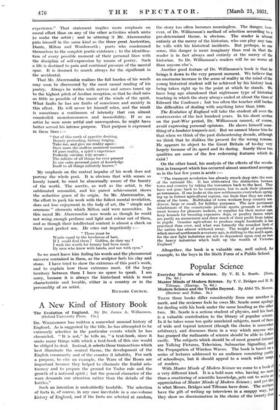Popular Science
Master Minds of Modern Science. By T. C. Bridges and H. B. Tiltman. (Harrap. 7s. 6d.) Modern Science and the Truths Beyond. By Abb4 Th. Morel's. (Browne and Nolan. 50.) THESE three books differ considerably from one another in merit, and the reviewer feels he owes Mr. Searle some apology for dealing with his book under the same heading as the other two. Mr. Searle is a serious student of physics, and his book is a valuable contribution to the library of popular science• In it he takes some ten quite unrelated subjects, most of them of wide and topical interest (though the choice is somewhat arbitrary), and discusses them in a way which anyone who has grasped the rudiments of science should be able to follow easily. The subjects which should be of most general interest are Talking Pictures, Television, Submarine Signalling, and the Propagation of Wireless Waves. The book is based on a series of lectures addressed to an audience consisting Pattiy of schoolboys, but it should appeal to a much wider mugs of readers. With Master Minds of Modern Science we come to a book of, a very different kind. It is a bold man who, having no mare than a smattering of scientific knowledge sets out to write an appreciation of Master Minds of Modern Science ; and yet this is what Messrs. Bridges and Tiltman have done. The authors have the gift of writing up interviews in a snappy way, but they show no discrimination in the choice of the twenty-four
scientists about whose careers and work they have written the short essays which make up the book. The essays them- selves are full of mis-statements and errors which an elemen- tary knowledge of science would have corrected, and on page 100 a full-page illustration shows the light from a star passing near the sun being deflected in the opposite direction to that in which it is in fact deflected.
The last of these books, Modern Science and the Truths Beyond, is a book the reading of which must produce despair in the hearts of those who would wish for a closer insight into one another's problems to be gained by students of Religion and of Science. This book, whose title suggests it to be a philosophical examination of the conclusions of science, is
really nothing more than a spirited attack on science, in which the author adopts every trick of the Courts in an attempt to discredit science. Fortunately his attack shows so little real understanding of science, and is so crude in its
delivery as to be quite unimpresgive. At times even the attack brings a smile to our faces as the author's enthusiasm makes him forget that there is a limit to the naivete which he may assume in his readers. The following quotation gives a
fair example of the author's attitude to science :-
"These insuperable barriers between the three essentially distinct grades of being (vegetative being, sensitive being and rational being) must be maintained by us at all costs, not only because they form an invincible argument against the evolutionists, but because we are philosophically convinced of their existence."



















































 Previous page
Previous page